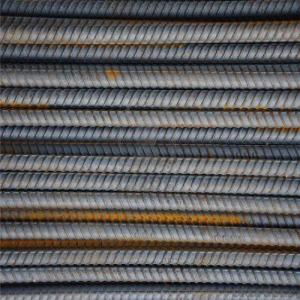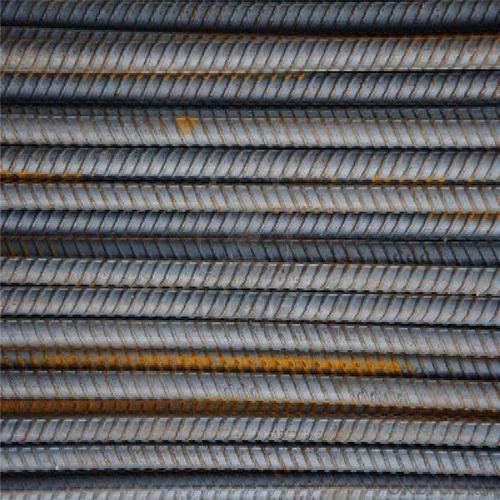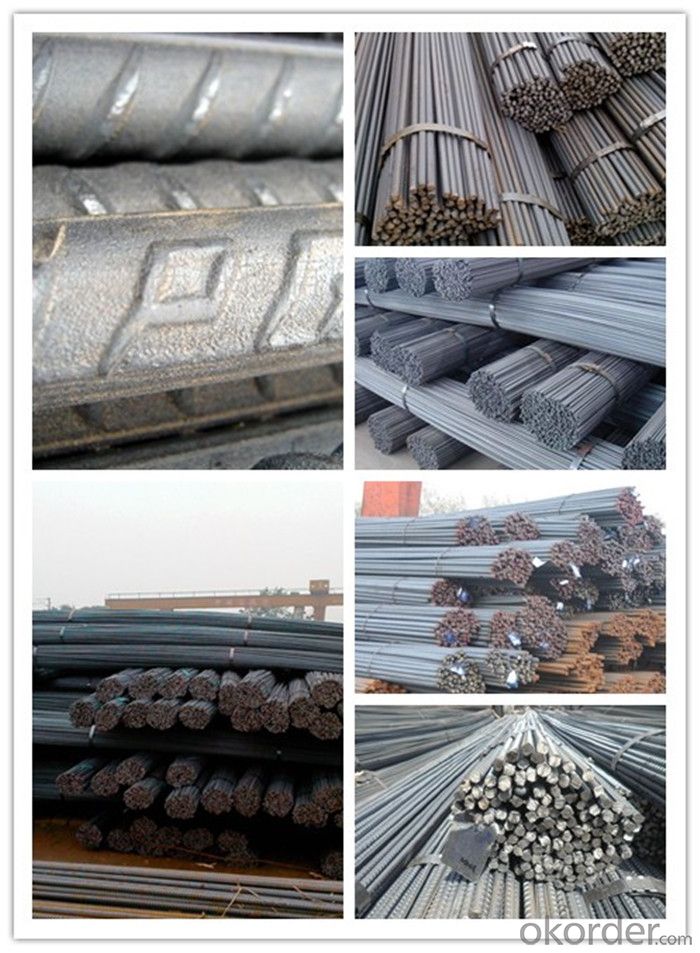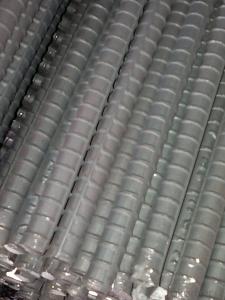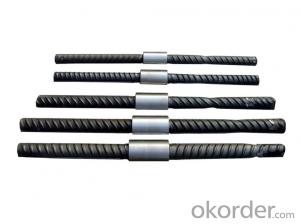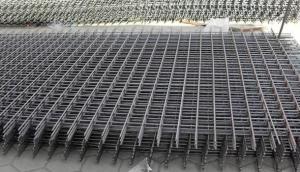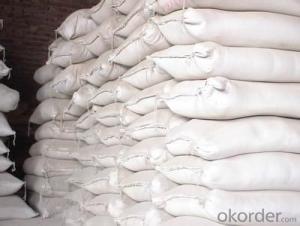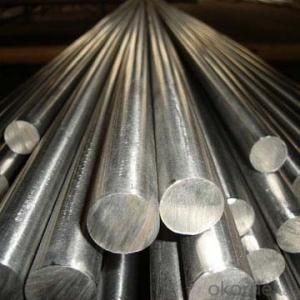Concrete Reinforced Steel Bar Used in Building
- Loading Port:
- Tianjin
- Payment Terms:
- TT OR LC
- Min Order Qty:
- 100 m.t.
- Supply Capability:
- 50000 m.t./month
OKorder Service Pledge
OKorder Financial Service
You Might Also Like
Specification
Concrete Reinforced Steel Bar Used in Building
Description of Concrete Reinforced Steel Bar:
1, Diameter: 5.5mm-10mm rounds reinforcing steel bar
10m- 40mm Concrete Reinforced Steel Bar
2, Length: 6m, 9m, 12m or customized
3, Standard: GB, ASTM, AISI, SAE, DIN, JIS, EN
OEM technology - send detailed technical parameters for accurate quotation.
2, Produce Process: smelt iron - EAF smelt billet - ESR smelt billet -
hot rolled or forged to get the steel round bar and plate
3, Heat Treatment: annealing, normalizing, tempering, quenching
4, Surface Treatment: Black
5, Quality Assurance: We accept third party inspection for all orders.
You can ask testing organizations such as SGS, BV, etc. to test our products before shipping.
Chemical Composition of Concrete Reinforced Steel Bar:
Grade | Technical data of the original chemical composition(%) | |||||
Reinforcing steel bar HRB335 | C | Mn | Si | S | P | B |
≤0.25 | ≤1.60 | ≤0.80 | ≤0.045 | ≤0.045 | >0.0008 | |
Physics Capability | ||||||
Yield Strength(N/cm2) | Tensile Strength(N/cm2) | Elongation(%) | ||||
≥ 335 | ≥490 | ≥16 | ||||
Reinforcing steel bar HRB400 | C | Mn | Si | S | P | B |
≤0.25 | ≤0.16 | ≤0.80 | ≤0.045 | ≤0.045 | 0.04-0.12 | |
Physics Capability | ||||||
Yield Strength(N/cm2) | Tensile Strength(N/cm2) | Elongation(%) | ||||
≥ 400 | ≥ 570 | ≥ 14 | ||||
Product Show of Concrete Reinforced Steel Bar:
Company Information:
CNBM International Corporation is the most important trading platform of CNBM group.
Whith its advantages, CNBM International are mainly concentrate on Cement, Glass, Iron and Steel, Ceramics industries and devotes herself for supplying high qulity series of refractories as well as technical consultancies and logistics solutions.

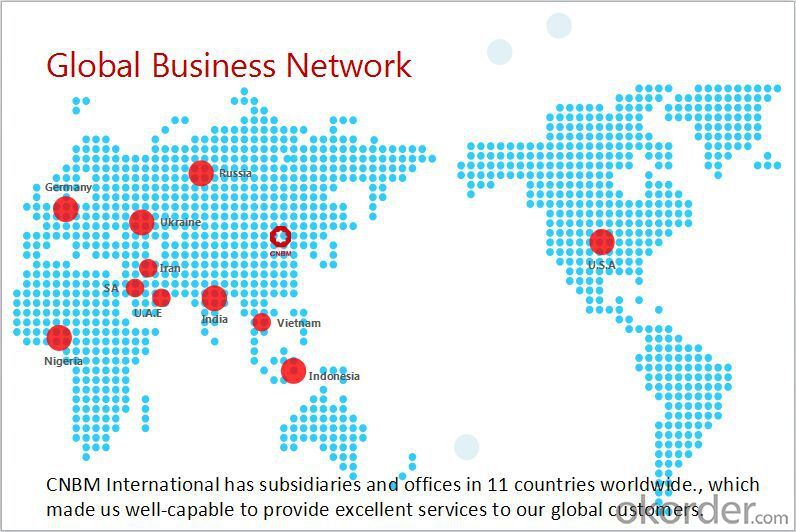
FAQ:
1, Your advantages?
professional products inquiry, products knowledge train (for agents), smooth goods delivery, excellent customer solution proposale
2, Test & Certificate?
SGS test is available, customer inspection before shipping is welcome, third party inspection is no problem
3, Factory or Trading Company?
CNBM is a trading company but we have so many protocol factories and CNBM works as a trading department of these factories. Also CNBM is the holding company of many factories.
4, Payment Terms?
30% TT as deposit and 70% before delivery.
Irrevocable L/C at sight.
5, Trading Terms?
EXW, FOB, CIF, FFR, CNF
6, After-sale Service?
CNBM provides the services and support you need for every step of our cooperation. We're the business partner you can trust.
For any problem, please kindly contact us at any your convenient time.
We'll reply you in our first priority within 24 hours.
- Q: How is case-hardening steel used in the production of gears and camshafts?
- Case-hardening steel is used in the production of gears and camshafts to enhance their strength and durability. This process involves heating the steel to a high temperature and then rapidly cooling it, creating a hard outer layer while maintaining a softer, more ductile core. This hardened surface layer provides resistance to wear, abrasion, and fatigue, ensuring the gears and camshafts can handle the demands of their respective applications.
- Q: What are the different types of welding techniques used for special steel?
- There are several types of welding techniques used for special steel, including TIG (Tungsten Inert Gas) welding, MIG (Metal Inert Gas) welding, Stick welding, and Flux-cored arc welding. These techniques are commonly used for welding special steel due to their ability to provide strong and precise welds, ensuring the integrity and durability of the material.
- Q: How does special steel contribute to improving product lifespan?
- Special steel contributes to improving product lifespan by offering enhanced strength, durability, and resistance to corrosion. Its unique composition and manufacturing processes result in a material that can withstand harsh conditions, heavy loads, and wear and tear over an extended period. This increased longevity and reliability of products made with special steel ultimately leads to reduced maintenance costs, less frequent replacements, and improved customer satisfaction.
- Q: How is maraging steel used in the production of aerospace components?
- Maraging steel is extensively used in the production of aerospace components due to its exceptional strength, toughness, and resistance to wear and fatigue. Its unique properties, achieved through a special aging process, make it ideal for critical components such as landing gear, engine shafts, and missile casings. The high strength-to-weight ratio of maraging steel allows for lighter, more fuel-efficient aircraft, while its durability ensures long-lasting performance in demanding aerospace environments.
- Q: How does special steel perform in defense applications?
- Special steel performs exceptionally well in defense applications due to its high strength, durability, and resistance to extreme conditions. It offers superior protection against ballistic threats, corrosion, and impact, making it ideal for armor plating, military vehicles, and personal protective equipment. Additionally, special steel's ability to withstand high temperatures and maintain structural integrity ensures reliable performance in critical defense systems such as missiles, submarines, and aircraft carriers. Overall, special steel plays a crucial role in enhancing the safety and effectiveness of defense applications.
- Q: Can special steel be used for making oil and gas industry components?
- Yes, special steel can be used for making oil and gas industry components. Special steels, such as stainless steel and alloy steel, are often preferred in the oil and gas industry due to their exceptional mechanical properties, corrosion resistance, and high temperature resistance. These components are exposed to harsh operating conditions, including corrosive environments, extreme temperatures, and high pressures. Special steels are specifically designed to withstand these conditions and maintain their integrity and performance over time. The use of special steels in the oil and gas industry ensures the reliability, durability, and safety of critical components, such as valves, pipes, fittings, and drilling equipment.
- Q: What are the specific requirements for special steel used in the oil and gas pipeline industry?
- The specific requirements for special steel used in the oil and gas pipeline industry include high strength, corrosion resistance, and toughness to withstand harsh operating conditions. The steel must also have excellent weldability and formability for ease of fabrication and installation. Additionally, it should have low sulfur and phosphorus content to prevent embrittlement and ensure long-term durability. Furthermore, the steel should possess high fracture toughness and resistance to hydrogen-induced cracking, as well as meet specific dimensional and mechanical property standards set by industry regulatory bodies.
- Q: What are the requirements for special steel used in aerospace defense applications?
- The requirements for special steel used in aerospace defense applications are quite stringent due to the critical nature of these applications. Some of the key requirements include: 1. High strength: Special steel used in aerospace defense applications must possess high strength to withstand extreme conditions and loads. This is essential for ensuring the structural integrity of aircraft and defense equipment. 2. Excellent corrosion resistance: Aerospace defense applications often expose the steel to harsh environments, including moisture, saltwater, and chemicals. Therefore, the steel must have exceptional corrosion resistance to prevent degradation and maintain its performance over time. 3. High temperature resistance: Special steel used in aerospace defense applications must have the ability to withstand high temperatures without losing its mechanical properties. This is crucial for components that operate in high-temperature environments, such as jet engines and rocket nozzles. 4. Fatigue resistance: The steel should be able to resist fatigue failure caused by cyclic loading, as aerospace defense applications often involve repeated stress cycles. Fatigue resistance ensures that the steel can endure long service lives without failure. 5. Lightweight: Weight reduction is a critical factor in aerospace defense applications to enhance fuel efficiency, increase payload capacity, and improve overall performance. Therefore, the special steel used should have a high strength-to-weight ratio, allowing for lighter structures without compromising strength. 6. High purity and cleanliness: The steel used in aerospace defense applications must have a high level of purity and cleanliness to minimize the presence of impurities and defects. This is crucial to ensure the reliability and longevity of the steel in demanding operational conditions. 7. Compatibility with other materials: Special steel used in aerospace defense applications should be compatible with other materials commonly used in these applications, such as aluminum alloys and composite materials. Compatibility ensures a reliable and efficient integration of different components and structures. Meeting these requirements often involves using advanced manufacturing techniques, such as vacuum melting, precise alloying, and heat treatment processes, to achieve the desired properties. Additionally, strict quality control measures, including non-destructive testing and material certification, are crucial to ensure the performance and reliability of special steel in aerospace defense applications.
- Q: Can special steel be used in the manufacturing of precision instruments?
- Indeed, precision instruments can benefit from the utilization of special steel. Special steel encompasses a range of steel types that have been purposefully crafted and processed to possess specific attributes, such as heightened strength, hardness, resistance to corrosion, and thermal stability. These unique qualities render special steel highly suitable for applications necessitating precision and accuracy, such as precision instrument manufacturing. Precision instruments, such as surgical tools, measuring devices, optical instruments, and scientific equipment, necessitate materials capable of retaining dimensional stability and enduring extreme conditions. Special steels, such as stainless steel, tool steel, and high-speed steel, provide exceptional mechanical properties, including remarkable tensile strength, resistance to wear, and dimensional stability. Consequently, these kinds of steel are well-suited for the production of precision instruments. Moreover, special steel can be engineered to possess specific characteristics, such as low magnetic permeability or excellent resistance to temperature fluctuations. These attributes prove particularly vital in precision instruments, as magnetic interference or temperature variations have the potential to impact their performance. To summarize, special steel can indeed be employed in the manufacturing of precision instruments due to its exceptional mechanical properties, dimensional stability, and ability to withstand harsh conditions. Its versatility enables the production of precision instruments of superior quality, fulfilling the stringent requirements of various industries, including the medical, scientific, and engineering sectors.
- Q: Can special steel be used in the packaging industry?
- Yes, special steel can be used in the packaging industry. Special steel alloys, such as stainless steel, offer excellent durability, corrosion resistance, and strength, making them suitable for manufacturing packaging materials and machinery. They are commonly used in producing containers, drums, cans, and machinery components for packaging applications.
Send your message to us
Concrete Reinforced Steel Bar Used in Building
- Loading Port:
- Tianjin
- Payment Terms:
- TT OR LC
- Min Order Qty:
- 100 m.t.
- Supply Capability:
- 50000 m.t./month
OKorder Service Pledge
OKorder Financial Service
Similar products
Hot products
Hot Searches
Related keywords
